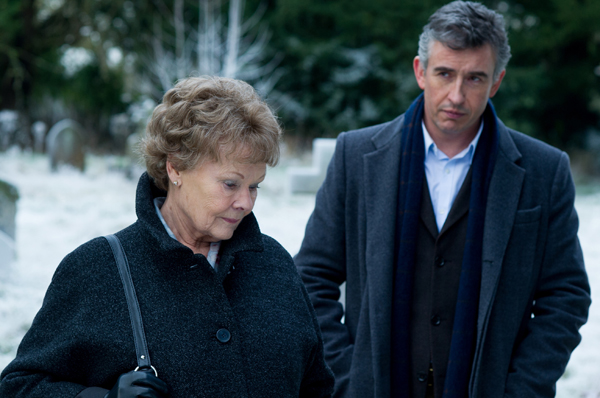Philomena, directed by Stephen Frears, one of Britain’s most distinguished filmmakers, is a remarkable and moving story. Scripted by Steve Coogan and Jeff Pope, the film is based on a true story recounted by Martin Sixsmith in his 2009 book The Lost Child of Philomena Lee.
Philomena (Judi Dench), a retired, working-class Irish nurse, reveals to her daughter, Jane (Anna Maxwell), that she’d had a son out of wedlock. (It would have been Anthony’s 50th birthday.) Shamed and abandoned by her family in 1950’s Ireland, she was sent to a convent, a home for other “fallen women,” to give birth. In compensation for the nuns’ ‘benevolence,’ she worked in the laundry with limited access to her growing boy before the three year old was sold for adoption to an American family without her consent. Philomena has been unsuccessfully searching for him ever since.
While waitressing at a party, Jane approaches Martin (Steve Coogan), an intellectual, middle-class journalist, and asks him to help her mother. Recently sacked as a spin doctor for Prime Minister Tony Blair, Martin is at a crossroads in his career, and he reluctantly agrees to meet Philomena. Despite his unease with a human interest story, Martin realizes that her experience is remarkable and pitches the idea to a magazine. Stonewalled by the church, Martin calls on all of his resources, assisted by a tenacious editor. Financed by the magazine, the odd couple travels from the Old to the New World on a poignant quest to find out what happened to Anthony.
Philomena is grounded, plain spoken, and a trusting soul who retains her religious faith despite all the injustices she has suffered. Martin is a confident and sophisticated, Oxford-educated cynic without religious conviction. The comedy of cultural clash, age, and experience sugar the pill of the tragic story, and the chemistry between the two leads is entirely believable and utterly charming. Coogan has struggled to break away from his comic creation Alan Partridge in recent roles, such as The Look of Love, and a revelatory Coogan delivers a fully rounded, serious character. Dench draws on her own Irish roots to embody Philomena Lee (who is still living) with quiet dignity and humility.
Co-writer Coogan gives Martin some of his trademark comic lines—“I now know what an intellectual diet of Reader’s Digest, The Daily Mail, and romantic novels does to the brain”—before forcing Martin to confront his underestimation of Philomena. While her humble background may mean that Philomena is easily impressed by luxuries that Martin takes for granted, she reads social situations far better than he does and delivers insights that challenge his intellect with her intuition.
Philomena also neatly lampoons the cynicism of human-interest publishers that commodify personal experience. As Philomena waivers over whether she wants her story published and offers to repay the magazine’s expenses, Martin is conflicted, under pressure to get the story but also determined to see justice done.
Featuring widescreen cinematography by Robbie Ryan, best known for his collaborations with British filmmaker Andrea Arnold (Wuthering Heights), and music by the sought-after Paris-born Alexandre Desplat, Frear’s extends his diverse canon with a fine balancing act that manages to be deeply sad and uplifting at the same time. A compelling narrative of love and loss and a beautiful portrayal of a transformative relationship, Philomena delivers a memorable punch.

















Leave A Comment